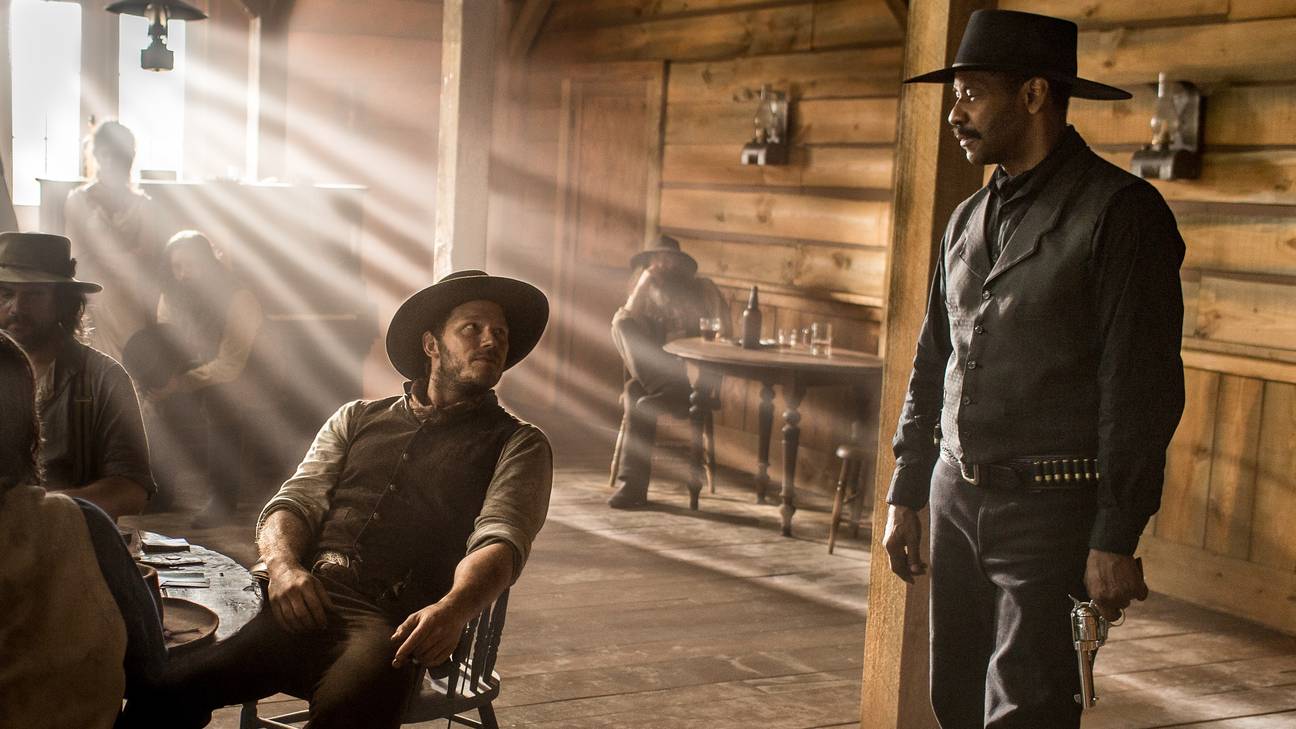SEPTEMBER 24, 2016
Out of all of the films that are coming out this fall (even the Oscar bait), the one movie to which I was most looking forward was Antoine Fuqua’s remake of John Sturges’ 1960 beloved “The Magnificent Seven,” which itself was based on Akira Kurosawa’s 1954 “Seven Samurai.” OK, that’s it with the film history. On to the shoot-outs!
I’ve always been a sucker for Westerns, even as a kid. But even early on, I realized that I was picky about just what kind of Westerns I liked. I had grown up watching TV Westerns, such as “Gunsmoke” and “The Rifleman,” which, for the most part, were shot on a sound stage and, for that practical reason, usually centered on the cowboy’s town. So to me, town Westerns were the real Westerns. There were some movie Westerns where the hero was stuck in the snow, and the conflict was him fighting with the forces of nature. Phooey. Give me an arrogant gunslinger or a corrupt land baron as an antagonist, and I would be so there.
Fuqua provides just that in “The Magnificent Seven” in the personage of bad guy entrepreneur Bartholomew Bogue (Peter Sarsgaard at his oiliest), who eerily evokes Donald Trump at times in his desire to possess everything around him in the mining town of Rose Creek. His lust for power drives him to kill off most of the town’s strongest men who could oppose him, including Matthew Cullen (Matt Bomer in a blink-and-you’ll-miss-him performance, a shame), leaving the town comprised of mostly widows and children. Easy pickings.
Not so fast. Matthew’s widow Emma (Haley Bennett) realizes that the town needs help from the outside and contacts bounty hunter (although that’s not what he calls himself) Sam Chisholm (Denzel Washington), who asks her if she’s seeking revenge. She replies that she’s seeking righteousness and then, pausing, says “…but I’ll I take revenge.”
And we’re off.
Chisholm knows that he needs some firepower and first comes across gambler Josh Faraday (Chris Pratt), who, after being asked to join Chisholm, wonders if the task at hand is difficult. “It’s impossible,” replies Chisholm. That’s good enough for Faraday. He’s in.
Eventually Chisholm recruits sharpshooter Goodnight Robicheux (Ethan Hawke), burly tracker Jack Horne (Vincent D’Onofrio), knife expert Billy Rocks (Byung-hun Lee), Comanche Red Harvest (Martin Sensmeier), and notorious outlaw Vasquez (Manuel Garcia-Rulfo, who’s charismatic as hell).
Washington, Pratt, Hawke and D’Onofrio are all known to us, but Lee, Sensmeier, and Garcia-Rulfo are newcomers, so it would have been extremely satisfying if we had a few more scenes when the Magnificent Seven actually bonded so that we can get to know them better. We know their skills, but we don’t know them.
Washington is solid as always as the adult in the room. Pratt does his wise-guy thing beautifully, although I wish he had better one-liners, which he could have knocked out of the park. To me, though, the most interesting performances come from Hawke as a sharpshooter who has suddenly lost his nerve to pull the trigger, and D’Onofrio, whose normal speaking voice is in the lower registers, adopting a high-pitched voice for his tracker character, which surprisingly works.
A word about the music in the film. Yes, Elmer Bernstein’s iconic theme from the 1960 “Magnificent Seven” is back, although you’ll have to wait until the end of the film to hear it. (But do stay, because it’s thrilling to hear it on the big screen again.) The remainder of the score is by composer James Horner (“Titanic”). Composers usually wait until the film is shot to compose the score so that they can match music to image. Horner, however, wrote the score entirely after reading the screenplay, and we’re grateful he did, because weeks after completing the score, he tragically died in a plane crash. As it turns out, “The Magnificent Seven” is one of Horner’s most beautiful scores, a fitting finale.
The problem that I have with “The Magnificent Seven” is the structure of the screenplay, written by Nic Pizzolatto, who created HBO’s “True Detective” (1st season – great, 2nd season – meh) and Richard Wenk, which compresses all of the character material in Act 1, then throws it out the window for Act 2, as the last hour of the film is virtually nothing but shoot-outs. Believe me, I bow to no man in my love of shoot-outs, but an hour? What seems like hundreds of “dead” stuntmen lying in the street is not drama to me, but that’s what we’re left with when he leave the cineplex.
Don’t get me wrong. “The Magnificent Seven” is a lot of horse-ridin’, cigar-smokin’ and bad-guy-shootin’ fun. But given the enormous talents of the people involved, I just wish that Fuqua and the screenwriters allowed us a little insight to the Seven, so that when they’re put to the test, we would care more. With that addition, “The Magnificent Seven” could have lived up to the “magnificent” in its title.
GRADE: B-












